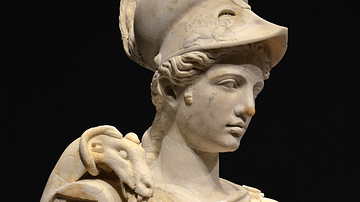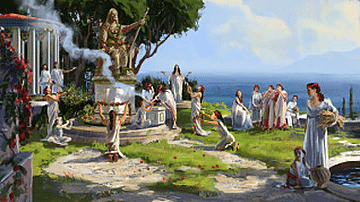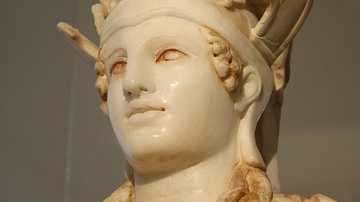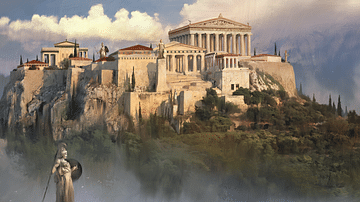Search
Remove Ads
Advertisement
Summary 
Loading AI-generated summary based on World History Encyclopedia articles ...
Search Results

Definition
Athena
Athena was the goddess of wisdom, war, and the crafts. She was the favourite daughter of Zeus and was, perhaps, the wisest, most courageous, and certainly the most resourceful of the Olympian gods. Zeus was told that his son would take his...

Article
Temple of Athena Nike
The Temple of Athena Nike, on the southwest bastion of the Acropolis, is smaller than the other buildings behind it but no less impressive. It was completed in 420 BCE during the restoration of Athens after the Persian invasion of 480 BCE...

Article
The Women of Athena's Cult
In ancient Athens, women had no life outside the home unless they were prostitutes or were engaged in religious activities such as festivals. Every Greek deity in every city-state had their own cult (sect) but the cult of Athena offered women...

Article
Athena Parthenos by Phidias
The magnificent temple on the Acropolis of Athens, known as the Parthenon, was built between 447 and 432 BCE in the Golden Age of Pericles, and it was dedicated to the city's patron deity Athena. The temple was constructed to house the new...

Image
Athena Parthenos, National Museum, Athens
A detail of a marble copy of the Athena Parthenos which stood in the Parthenon. Also known as the Varvakeion Athena, it is the best preserved such copy. 3rd century CE. (National Archaeological Museum, Athens)

Definition
Acropolis
An acropolis is any citadel or complex built on a high hill. The name derives from the Greek akro, "high" or "extreme/extremity" or "edge", and polis, "city", translated as "high city", "city on the edge" or "city in the air", the most famous...

Video
Athena the Greek Goddess of Wisdom, War and the Crafts
Athena was the Greek goddess of wisdom, war, strategy, the crafts and weaving, and the defence of towns. She was a resourceful goddess, a favourite of her father Zeus, and often provided good counsel to other gods (including Zeus, the kings...

Image
Athena Parthenos Reconstruction
A modern reproduction of the lost statue of Athena which once resided in the Parthenon of Athens. The 12m high original, sculpted by Pheidias in the mid-5th century BCE, was made of an inner wooden core covered in ivory and gold. In her right...

Image
Athena Statue
Statue of Athena wearing a Corinthian helmet, the aegis and Gorgoneion (detail), c. 180-190 CE. Liebieghaus, Frankfurt am Main.

Image
Athena Parthenos, Palazzo Altemps
Athena Parthenos; 1st century BCE copy by Athenian sculptor Antiochus of the famous original from 5th century BCE by Phidias; Arms and nose are part of 17th century CE restoration; Palazzo Altemps in Rome, Italy